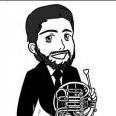Leaderboard
Popular Content
Showing content with the highest reputation on 08/07/2019 in all areas
-
Preface: I am a formally trained musician. Went through public school band from 6th grade through high school, got 3 undergrad degrees in music (education, horn performance, and classical composition), and am almost finished with a master's degree (classical and jazz composition). I finished my undergrad with 214 credit hours and am currently 23/31 hours through the master's degree. I am a professional performer (classical and jazz), and a high school band director, but have taught theory and private lessons and classes on guitar, bass and piano. I have performed in almost every genre that uses live performances, on many different instruments. I see many discussions about the importance of music theory, and honestly most of these discussions disappoint me, but not in the way you would think by the preface above. All musicians fall into one of two categories - Music theory is necessary, or Music Theory is unnecessary. There are no other categories, although there are subgroups. I'm going to start off by saying, that by far, modern music theory is one of the worst taught classes in the history of classes. I put it below most high school Spanish classes. If you compare the standard expected of music theory students to that of a standard biology or English class, it is almost laughably low. I don't know many classes where it is not only normal, but understood by the *teachers* of a class that half or more of your students are going to not learn the material. This is absolutely absurd. Further than this, I don't know of any creative art other than music where the system of organization used to understand it is emphasized so heavily as rules. Let's give an analogy to help this sink in. You're in an English class, studying Shakespeare. You're learning about the plays of Shakespeare, but it's communicated that the traits that were used in Shakespeare's style of writing are the rules that dictate how books are written, and if you don't follow them, you're wrong. Right off the bat, you should see some red flags with this. "But what about Earnest Hemingway? He breaks the rules here, does that mean he's not a real author?" "Yes. He broke the rules, so he doesn't write real books." This is about how music theory is approached by many teachers. If you see this, and understand that this is not what music theory is supposed to be, you'll see why almost all arguments against it fall apart really hard. So what is music theory? Music theory IS a form of analysis. It is a way to listen and analyze music and understand what's going on. It's a way to learn music, and a way to communicate music. Music theory IS NOT a bunch of "rules" that tell you how to write music. It IS NOT a way for classical musicians to point at things they don't like and say "this is worthless." If it is used that way, it's used very wrong. Music theory IS a way to compare styles of music to see what is similar and different, and be able to understand what makes an unfamiliar style of music relatable to styles you are familiar with. Music theory IS NOT tied to or directly related to sheet music. If you don't read sheet music, you are no less of a musician. Theory actually doesn't have much to do with notation on a fundamental level. You know how I mentioned I used to teach guitar classes to high school kids? When I taught guitar classes, I taught theory. But I didn't say "we're learning music theory today, here are the rules." It really was more like this: Let's listen to this Johnny Cash song. Let's learn it, do this now. Alright, how is it similar to <song we learned last week>? These chords here, are they the same as <other song>? Yes. This is called a 12-bar blues progression. Let's look at it. The class learned 25 songs in the next week. Because we had the framework of what a 12-bar blues progression was, and the theory behind it, we went from learning one song a week, chord by chord to 25. We learned 25 songs that used the 12-bar blues progression. This was music theory applied directly to understand music better. We then did a quick lesson on lyric form (the rhyme scheme and whatnot) of most 12-bar blue songs, and I had them write one. There was no lack of creativity here. They could write a song then teach it REALLY easily because everybody had the common language and framework. Further than this, in similar ways, my students could play in all 12 major AND minor keys. They could figure out how to finger chords they didn't know. For example, this chord is an Ab major 7th chord. How do you finger it without looking at a chord chart? They knew what notes were in that chord, and what do do with the strings to get that chord to happen, and then they remembered the fingering. This is what music theory is If you're looking at my description and saying "But you didn't teach music theory." You're wrong. I gave them the same written test that I gave the students I was just teaching theory to. They did just as fine as guitar students as the ones who were specifically theory students. Test scores showed very little deviation when compared. This is how music theory is supposed to be. Music theory is the inner workings of music, and why things sound the way they do. Music theory is the reason I can hear a song I've never heard before, and learn it in a short period of time. Any time you hear a song and go "That's the same chord progression as <different song>" you're using theory. If you write music AT ALL, you're using music theory. You may not think that's what you're doing, but that's what you're doing. If you know that *this chord* followed by *this chord* sounds good, but don't know what those chords are called, you're still using theory. If you know that writing a song using the form "Intro, verse, chorus, verse, chorus, bridge, chorus, chorus" makes your song make sense, you're using theory. All musicians who produce music are using theory whether they know it or not. The advantage of knowing theory is that you can talk about music in a consistent way and help others understand either the music you write, or the music you like. If you hear something I write, and really like it, I can tell you EXACTLY what I did to create that sound and where I got that chord progression/texture from, so you can learn more about it. You know how I mentioned that I have degrees in composition? I have a degree in composition, and am almost done with another one. I took 14 theory classes in my undergrad. The same 4 intro classes, and 10 specialized classes (such as jazz theory, 20th century analysis, 18th century counterpoint, and electronic music). In all of these classes, the professor (a composer) would ALWAYS have us listen to the piece before doing any theoretical analysis on it. It didn't matter if it were by Bach from 1730, or if it were by Charlie Parker in 1950. We listened to it and thought about how it was similar and different to what we knew. The analysis ALWAYS fit what the music was doing. If we were analyzing a Bach chorale, we looked at it using the style tendencies and traits that defined that style. If we were analyzing a Charlie Parker tune, we looked at it using the style tendencies and traits that defined that style. We didn't do this with one set of rules and traits for both styles, unless they were similar enough where we could do that and actually make sense of that. As a composition student in lessons, if I wrote a piece in the style of Glenn Miller and his big band, we would look through Glenn Miller sheet music and listen to the charts to find out "Why does it sound the way it does, and what can you do to get that kind of sound in your pieces?" If I wrote a piece in the style of modern, 20th century classical music, we would analyze pieces of classical music from the 20th century and find out why they worked. Then, when writing a piece, I could express myself in that style. The argument that music theory destroys your creativity is valid only if you're viewing music theory as a set of rules that you have to follow. If you view any creative adventure like that, your creativity will be stifled. However, if you view it as a series of tendencies and style traits that make music sound the way it does, it frees you to write in any style you want, authentically, and express yourself. As a composer, I write a lot of music that blends jazz, fusion, and classical. I write things I'm proud of and think are pretty creative. But they are that way because I know how to look at music I like and take things from it and use them to express myself. THIS IS THE WAY MUSIC THEORY SHOULD BE TAUGHT AND USED. THIS IS WHAT MUSIC THEORY IS AND WHAT IT IS SUPPOSED TO BE USED FOR. One little side note If you're using your knowledge of theory to say that somebody else is not a real musician, or they don't know what they're doing, or that music has rules, shame on you. You're giving formally trained musicians a bad name. Alternatively, if you are one of those people who brags about not knowing theory and tries to flex on the people who say you need to know theory, you're as big of an ass as they are. I hope that my little essay here has helped you understand a new perspective on music theory and why I feel the argument against it is not particularly valid in most cases.2 points
-

PRC396 - Star of the Bosses (Phantasy Star 2)
HoboKa reacted to Bundeslang for a topic
The People's Remix Competition 396 PRCv16-11 Hello everyone and Welcome to the People's Remix Competition! In PRC394 it was again HoboKa who won the contest. Like in last round, he picked something from Phantasy Star 2. Source: Phantasy Star 2 - Boss MIDI File Source Information ThaSauce link: Click here to submit To submit a song at the compo page you can use the ThaSauce page. If you use this, an account is required. If you don't want to use ThaSauce, please upload the song somewhere else and post a download link in this thread. I recommend Soundcloud, don't forget to allow downloads to enable me to upload the song at ThaSauce. I will keep using ThaSauce as the place where all songs are located. If you want to use ThaSauce, the following steps should be done. Click the ThaSauce Link. Click the 'You are not logged in' button in the upper right. Click on 'register' (at the bottom). Read the terms and click 'I agree to these terms'. If you don't agree with them, upload the song somewhere else and post a download link as mentioned above (by doing that, you allow me to upload the song at ThaSauce. Continue the process by filling in your information. You will get a question to confirm that you're not a robot. Here are some possible answers: Name a compo: PRC Who organizes One Hour Compo: Starla Name a ThaSauce subdomain: compo.thasauce.net Who created Mega Mans: Capcom A confirmation mail will be send. There might be some issues with it (meaning that you don't get it), if that is the case, upload the song somewhere else as described above. Once registered, login with your username and password, go to the mentioned page and submit the song. If you want submit two or more songs you can create multiple ThaSauce accounts or upload the song somewhere else and post the download link. After uploading your song, please check if your song plays and can be downloaded and played without problems. Only upload MP3 files. PRC instructions The deadline is Saturday August 31st 2019 at 10:59 am ThaSauce time (18:00 UTC, 19:00 GMT), check the ThaSauce page for the exact time left. Make sure that the song is uploaded to ThaSauce or that there’s a download link posted in this thread. 3 Extra days. You may enter as many mixes as you like and work with as many people as you like on each mix. You are free to create a second ThaSauce account for that if you use ThaSauce, it's needed to be able to upload a second remix if you use ThaSauce. Of course you can also upload it somewhere else and put a download link in this thread. Do not make qualitative comments on an entry until the results of the vote have been posted in this thread. Mixers cannot vote for themselves but if they vote they receive a free first place vote added onto their score. The winner of this round may select the source for PRC398, the round after next round. The winner of PRC394, HoboKa, who picked this source, can only participate by submitting a Bonus Mix. His vote is doubled in the voting stage. You can find the full rules list at this page as well. GOOD LUCK! PRC ThaSauce Home Page1 point -

PRC395 - A Silent Star (Phantasy Star 2)
HoboKa reacted to Bundeslang for a topic
Welcome to the voting stage The mixing stage is over. This round has 2 songs and 1 bonus song by HoboKa. The following people compete against each other: TheVideoGamer Silverpool64 To vote, do the following: · Visit the stated ThaSauce Page and listen to all the entries. · Scroll to the form at the bottom of the screen or click PM. · Fill in the entries from first to second in the ThaSauce form or fill in your top 2. · State a reasoning for it. · Participants are encouraged to vote and leave feedback. However, they may not vote for themselve, so it doesn't affect the results. · Do not vote for HoboKa, his song is a bonus. · Always look in this thread to find out who's the winner of the round after the voting stage instead of only looking at ThaSauce for the results. Especially since some people might vote by sending me a PM. You have until THIS Monday, August 12th 10:59 AM ThaSauce time (17:00 UTC, 18:00 GMT) to vote. If you vote by PM make sure that your top 3 is clear. I prefer something like this: (To) (Subject) PRC ### Vote (Message): 1: (remixer A ) 2: (remixer B ) 3: (remixer C ) (reasoning) I will post the feedback given in the PM’s and the votes in this thread. The winner may choose the source tune for PRC397. Check the ThaSauce Page to vote or click here to send a PM. (Copy Paste doesn't work as before so that's why the layout is a bit different as usual)1 point -

OCR01286 - Metroid Prime "Just a Little More (Prime Edit)"
DarkeSword reacted to Souperion for a topic
Has it really been 15 years since this came out? I remember being enthralled by this mix years ago, and it has failed to lose any of it's original luster. It's earned an eternal place on my playlists, an remains a musical inspiration. A triumph, DarkeSword.1 point -

MnP 104: Sonic Lost World - Tropical Coast Act 1
TheVideoGamer reacted to HoboKa for a topic
some stuff came up, so i won't be able to submit from normal time. Last minute drawbacks.1 point -

MnP 104: Sonic Lost World - Tropical Coast Act 1
TheVideoGamer reacted to HoboKa for a topic
2 day ext. Deadline: August 10th Vote Ends: August 12th1 point -
1 point
-

In defense of music theory
Eino Keskitalo reacted to zykO for a topic
ah yes and therein lies a rather substantial chunk of the problem... just the other day, i was listening to Dave and Chris Brubeck's Ansel Adams: America piece for the first time and was thoroughly moved by it. later that evening at band rehearsal, i eagerly wanted to rant and rave about it like the moment i got there lol i sought to describe how intricately they had woven Chopinesque romantic piano with grandiose baroque piano ala Bach all the while writing this sweeping symphonic and rather American (Coplandesque, i suppose) tribute to one of the great American artists. I ultimately described it to them just as i did now hahaha ie. in very broad strokes, emphasizing the tonal palette they used, the way the different elements juxtaposed and interacted. in the end, i had analyzed and related the piece as would a curator rather than as a composer but when i had piqued their interest and they wanted to know more about how exactly the Brubecks accomplished such a magnificent synthesis, i ran into the quandary of not really knowing exactly how to describe it properly. i eventually would get the point across and they certainly are used to playing with me so they understood me and my quasi-technical lingo... but i was reminded, yet again, of just how practical having that formal training and technical background is. hell, it could have at least saved us the hour we could have instead been working on our set, not listening to me fumble about with chromaticism and diatonicism lolllllllll the knowledge gained from proper formal training may very well have made me a better, more efficient, more compelling composer over the years... we'll never really know since i abandoned classical training a long time ago... but it is in these sorts of instances when confronted with having to communicate or break down a truly nuanced and complex piece of music that requires more than just a rudimentary harmonic analysis, that training can be and is quite practical indeed. it isn't that music theory ever has to be dry. it's just that as with a lot of things, the status quo prevails and institutions as old as "western music" are unshakable even when blasted by a barrage of jazz, punk, electronica, etc. over the years. in the end, the establishment holds because it was built a long, long time ago and it isn't really broken; it just requires its educators to be mindful of emphasizing why we should use the knowledge rather than just providing it. or maybe, i have no idea what i'm talking about lol1 point


